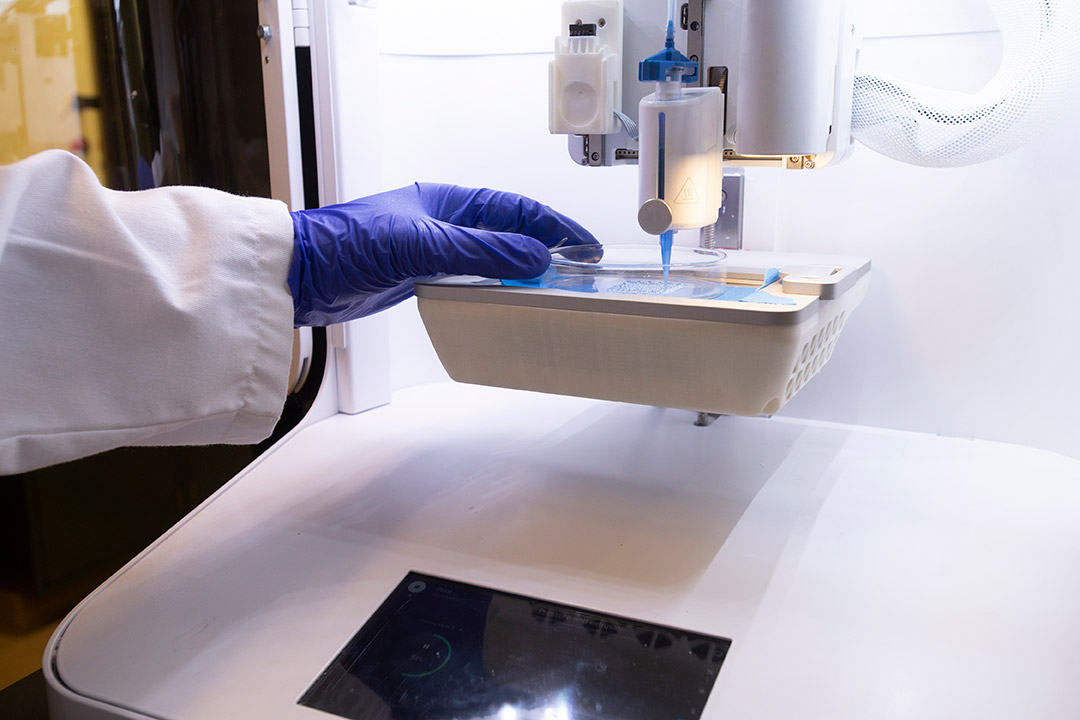University sponsored research funding exceeds $90 million for the first time
Increases in collaborative projects and inter-organizational engagements combine for another record funding year at RIT
A. Sue Weisler
RIT research funding topped $90 million for the first time in 2022.
Increased awards for advancing biomedical technology and economic development initiatives have lifted Rochester Institute of Technology to another record year of sponsored research funding.
As of July, the university has attained more than $92 million in research funds for individual and multi-disciplinary proposals. Since fiscal year 2017, the amount had regularly hovered between $75 million to $80 million, and this newest increase surpasses these totals taking into account more focus on development of cutting-edge technologies and supporting economic growth.
“With federal funding, stimulus packages which are still being distributed, and even with the new Innovation Bill, there is an increase in money being distributed to federal agencies that fund research. Much of it is being directed toward universities and organizations emphasizing collaborations and economic development, all toward competitiveness of the U.S.,” said Ryne Raffaelle, RIT vice president for Research and associate provost. “We are more competitive, which is what these grants show, and we are teaming with other universities on research projects, which is a testament to our growth in the research space.”
That broad spectrum of funding came from a combination of federal, state, corporate, and foundation resources. Significant grants include:
- CAREER Awardees—Since 2014, 16 faculty have been honored with prestigious CAREER awards from the National Science Foundation. The most recent awards were to chemical engineering Assistant Professor Poornima Padmanabhan to discover origins of entangled molecules and to Daniel Krutz, assistant professor of software engineering, for work in teaching students how to create inclusive and unbiased software.
- National Institutes of Health funds—Funding from the NIH has traditionally been given to improve new medical interventions and drug treatments. With the challenges of managing COVID as well as increased health care costs, new strategies for improved health care detection and devices are increasingly being funded. Associate Professor Maureen Ferran will explore solutions to treat prostate cancer cells’ susceptibility to viral infections. Brenda Abu, researcher in RIT’s Wegmans School of Health and Nutrition, is investigating pica and iron deficiency anemia among pregnant women.
“It is an indication of our maturity as we continue to grow and build even more collaborations with academic and national research institutions in the niche areas where we really stand out,” said Kate Clark, director of RIT’s Sponsored Research Services.
RIT’s key areas include nanotechnology, optics and imaging science, cybersecurity, and artificial intelligence. Many of these awards were funded by national agencies such as NSF ($13.5 million), the Department of Defense ($8.6 million), NIH ($6.7 million), and both NASA and the Department of Energy ($2.5 million each).
Representing a research portfolio that is more balanced across the university, current trends in awards include more cross-college and cross-organizational collaborations. Examples are:
- The first cohort of students who are part of the NSF Research Traineeship Program will begin this fall. They will be part of the recently funded initiative AWARE-AI to improve the diversity gap in computer and information sciences, specifically in the area of artificial intelligence. Led by Cecilia Alm, associate professor in RIT’s College of Liberal Arts, the team will have representation from five colleges and several of the university’s research centers. Its focus beyond improving the pipeline of AI scholars and researchers is on building more opportunities for RIT’s African American, Latino American and Native American (AALANA) populations and its Deaf and hard of hearing students.
- RIT’s Battery Prototyping Center partnered with Binghamton University’s New Energy NY Project that received Phase I funding of the American Rescue Plan’s Build Back Better Regional Challenge. Funds will be used to develop a broader proposal for a regional battery manufacturing and energy technology hub.
- RIT’s Center for Public Safety Initiatives received a grant from the Greater Rochester Health Foundation to create coordinated services for victims of gun violence, a model that can make an impact locally and nationally.
“This university-wide interdisciplinary, balanced type of portfolio is what we’ve always wanted, and something which we thought we’d be good at, and we are seeing that the federal agencies want to fund these projects,” said Raffaelle.
More information about the awards received through the year can also be found on RIT’s Research website. Sponsored Research funding contributes to Transforming RIT: The Campaign for Greatness. The $1 billion campaign takes a blended approach, seeking support from a variety of investors including alumni and friends, government and corporate partners, and research foundations and agencies.








